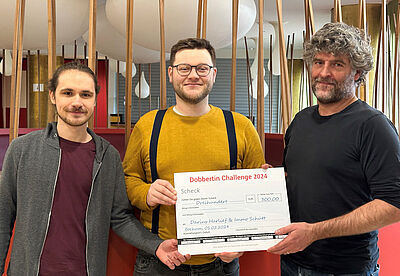Knowledge, creativity, and a good dose of perseverance - all these were needed to solve the Dobbertin Challenge 2023. For three long weeks, IT students tried to tackle the especially difficult problem.
Finally, Darius Hartlief and Immo Schütt, IT security students in their 2nd and 6th semesters at the Faculty of Computer Science, were able to master the cryptographic challenge and win the prize money of 300 euros. "Teamwork and interdisciplinary collaboration are key! We combined Immo's theoretical knowledge from his Math bachelor's degree with my expertise in the practical domain. It's crucial to communicate effectively to successfully find a joint solution," explained Daniel Hartlief.
This year, the task was set by Gregor Leander, Deputy Speaker of the HGI and Head of the Chair of Symmetric Cryptography. During the award ceremony on February 7th in the Open Space of the MC building, Leander emphasized, "The Dobbertin challenge is an excellent opportunity for students to prove their talent beyond their studies!"
The Dobbertin Challenge has existed since 2006 and challenges students to tackle complex cryptographic challenges every year. The competition is organized in memory of the deceased Professor Hans Dobbertin, the founding director of the Horst Görtz Institute for IT Security (HGI) and Chair of Cryptography and Information Security (2001-2006). Participation is open to all bachelor's and master's students of IT Security, Applied Computer Science, Mathematics, and Electrical Engineering.
Further information about the challenge is available at https://hgi.rub.de/en/dobbertin-challenge.
General note: By mentioning gender-assigning attributes, we imply all those who feel they belong to this gender, regardless of their biological sex.


